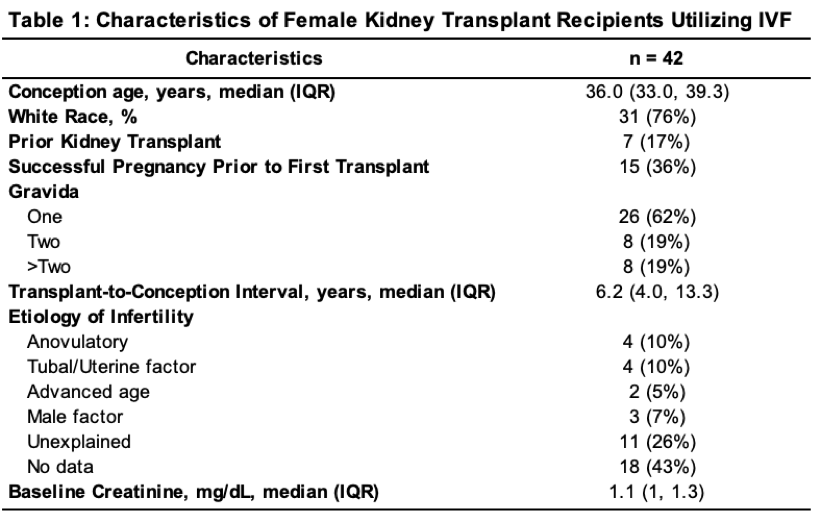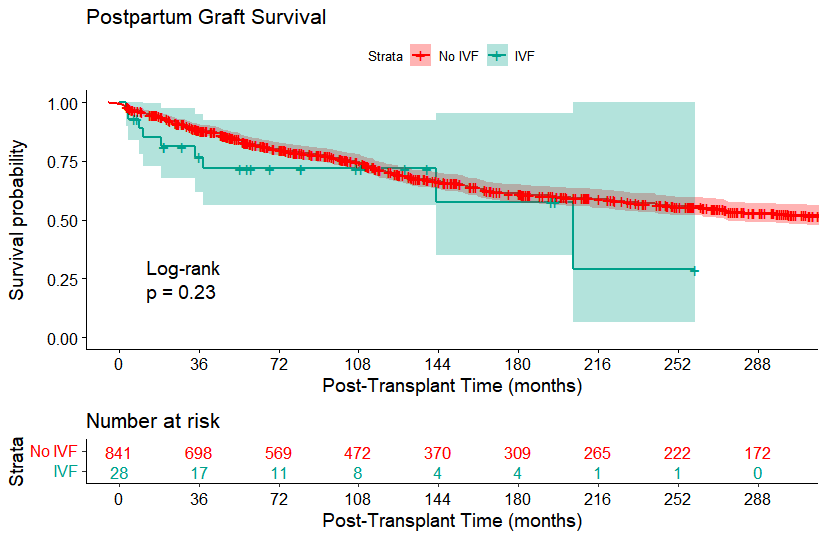In Vitro Fertilization Use Among Female Kidney Transplant Recipients
L. A. Coscia1, J. M. Konel2, M. Bowring3, S. Constantinescu4, M. J. Moritz5
1Transplant Pregnancy Registry International, Philadelphia, PA, 2Wayne State University School of Medicine, Detroit, MI, 3Johns Hopkins University School of Medicine, Baltimore, MD, 4Medicine, Lewis Katz School of Medicine at Temple University, Philadelphia, PA, 5Surgery, Lehigh Valley Health Network, Allentown, PA
Meeting: 2022 American Transplant Congress
Abstract number: 19
Keywords: High-risk, Kidney transplantation, Pregnancy, Quality of life
Topic: Clinical Science » Kidney » 33 - Kidney Psychosocial
Session Information
Session Time: 3:30pm-5:00pm
 Presentation Time: 4:20pm-4:30pm
Presentation Time: 4:20pm-4:30pm
Location: Hynes Ballroom A
*Purpose: Infertility is common among female kidney transplant recipients (KTRs). In vitro fertilization (IVF) is a potential option. The purpose of this study was to survey the safety and success rate of pregnancy via IVF among female KTRs.
*Methods: Data were collected by the Transplant Pregnancy Registry International through questionnaires, telephone interviews, transplant staff, and hospital records.
*Results: Of 1,218 female KTRs reporting to the TPRI, 33 recipients reported using IVF for conception: 42 pregnancies with 46 outcomes, includes 4 sets of twins. (Table 1) Issues reported during pregnancy included: chronic hypertension 45%, preeclampsia 29%, gestational diabetes 14%, and placental anomalies 17%. Only 1 recipient experienced rejection during pregnancy. Pregnancy outcomes were: 36 live births (86%), 4 spontaneous abortions, 1 ectopic, and 1 stillbirth. Data as median (IQR): maternal age at conception 36 years (33-39), gestational age 36.0 weeks (32-38), and birth weight 2579 g (1576-3005). Delivery by Cesarean section 57%. At last follow-up at an average age of 7.6 years, 39 children were reported healthy and developing well. Congenital defects were seen in 4 newborns: 1 cleft lip and palate, 1 duodenal atresia, and 2 were lip and tongue tied. Maternal follow-up was a median of 5 years with 81% reporting adequate graft function. Three recipients died from 11 months to 22 years postpartum, Causes of death: 2 myocardial infarction and 1 cancer. Six recipients (14%) experienced graft loss within 2 years of their last pregnancy. There was no difference in long term graft survival between KTRs who conceived with vs without IVF. (Figure 1).
*Conclusions: Successful pregnancies via IVF were reported in female KTRs with livebirths in 86% of pregnancies. Long-term graft survival was not affected in female KTRs conceiving via IVF. Kidney transplant recipients who require fertility assistance should not be discouraged from utilizing IVF.
To cite this abstract in AMA style:
Coscia LA, Konel JM, Bowring M, Constantinescu S, Moritz MJ. In Vitro Fertilization Use Among Female Kidney Transplant Recipients [abstract]. Am J Transplant. 2022; 22 (suppl 3). https://atcmeetingabstracts.com/abstract/in-vitro-fertilization-use-among-female-kidney-transplant-recipients/. Accessed February 19, 2026.« Back to 2022 American Transplant Congress


